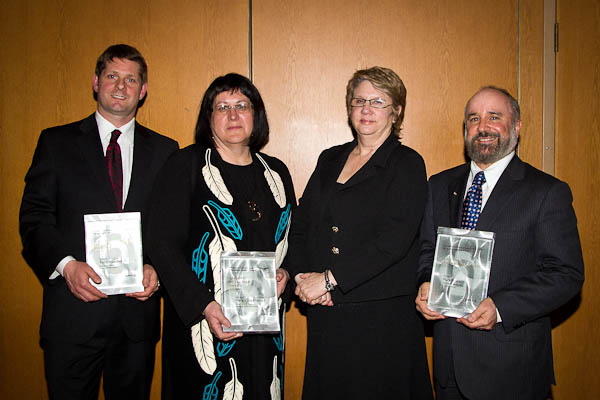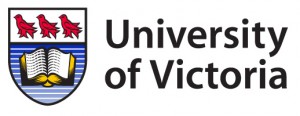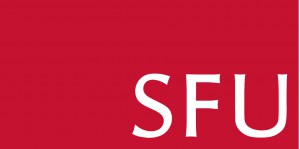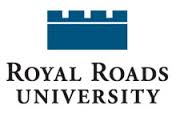
From Left to Right: Dr. Todd Woodward – Early in Career Award, Dr. Margo Greenwood – Academic of the Year Award, Dr. Moira Stilwell – Minister of Advanced Education and Labour Market Development, Prof. Mark N. Wexler – Paz Buttedahl Career Achievement Award
A UBC professor who developed an innovative therapy to assist people with schizophrenia, a UNBC professor who is a tireless educator, researcher, and advocate for improving health outcomes of Aboriginal peoples, and an SFU professor who has devoted his career to helping others deal with thorny ethical dilemmas received the 2010 CUFA BC Distinguished Academics Awards on Wednesday, April 7th.
UBC’s Dr. Todd Woodward was the inaugural recipient of the Early in Career Award-Sponsored by Scotiabank for applying his research on brain functioning in people with schizophrenia to create a new therapy to help those with the disease to control their symptoms.
UNBC’s Dr. Margo Greenwood was named Academic of the Year for publication of the ground breaking report “Aboriginal Health: Leaving No Child Behind”– prepared for UNICEF by the National Collaborating Centre on Aboriginal Health (NCCAH), which is led by Dr. Greenwood.
SFU’s Professor Mark N. Wexler received the Paz Buttedahl Career Achievement Award for his 30 years of applying his scholarly work on business ethics to practical problems in business, government health care, and other fields, and for engaging the broader community in a dialogue about ethics.
These awards are presented annually by the Confederation of University Faculty Associations of BC (CUFA BC) to recognize faculty members at BC’s public universities who use their research and scholarly work to make contributions to the wider community.
“Dr. Woodward, Dr. Greenwood, and Professor Wexler are outstanding examples of faculty members at BC universities who use their research to benefit the wider community,” said Dr. Paul Bowles, President of CUFA BC.
“Dr. Woodward’s efforts to make his research relevant to the lives of people with schizophrenia is amazing for someone so early in their career,” Bowles continued. “Dr. Greenwood’s report is just one of the many contributions she has made in an effort to get governments to understand and address the needs of Aboriginal communities. Dr. Wexler’s practical, hands-on approach to ethical reasoning, combined with a solid academic foundation, fuels the demand for his expertise as a consultant, advisor, and speaker.”
Mark Forsythe, host of CBC Radio One’s BC Almanac, emceed the awards dinner on Wednesday, April 7th at the Law Courts Inn in Vancouver.
The CUFA BC Distinguished Academics Awards are in their sixteenth year and receive generous support from Scotiabank, Pacific Blue Cross, CBC Radio One, University of British Columbia, Simon Fraser University, the University of Victoria, the University of Northern British Columbia, and Royal Roads University.
BACKGROUNDER
2010 CUFA BC DISTINGUISHED ACADEMICS AWARDS RECIPIENTS
APRIL 7, 2010
EARLY IN CAREER AWARD – SPONSORED BY SCOTIABANK – 2010
DR. TODD WOODWARD – DEPARTMENT OF PSYCHIATRY – UNIVERSITY OF BRITISH COLUMBIA
The first award recipient this evening is Dr. Todd Woodward, a faculty member in the Department of Psychiatry at the University of British Columbia. Dr. Woodward is the inaugural recipient of the Early in Career Award – Sponsored by Scotiabank.
The hidden world of mental illness makes identification and treatment of the disease incredibly difficult. The multiple and overlapping effects of physical, psychological and environmental factors mean there are no easy answers.
So, UBC’s Todd Woodward found it fascinating that data he was helping to analyze indicated that the many symptoms of schizophrenia cluster together into only three distinct categories. These findings were part of his wife’s PhD dissertation at the University of Victoria, where they were both graduate students, and got him thinking about what his field of research – brain functioning – could contribute to understanding this phenomenon. So great was his curiosity that it led him to switch his research focus from Parkinson’s disease to schizophrenia.
It was this new research focus that ultimately led to the creation of the MetaCognitive Training program-a tool for helping people with schizophrenia to identify and control thought patterns that exacerbate their illness.
Raised and educated in British Columbia, Dr. Woodward could have easily confined his research findings to scholarly journals and had a very successful academic career. However, he wanted to share the knowledge gained through his field of study with the people for whom it mattered most-people with schizophrenia. So, he and his colleague, Steffen Moritz, combined the results of their research on the development and maintenance of false beliefs with the results of other teams studying thinking biases to create this unique group therapy program.
The MetaCognitive Training program allows people to experience these thinking biases in a fun and relaxed setting, so that awareness of the nature of these biases is heightened, providing tools that people with schizophrenia can use to reduce the impact of their symptoms.
The MetaCognitive Training program has now been translated into 15 languages, is being used in hundreds of care centres worldwide, is the subject of three large-scale, international, randomized studies to confirm its efficacy, and is also being adapted into a program that can be used in one-on-one therapy.
At a time in his career when many young academics are focused exclusively on the teaching and research requirements necessary to obtain tenure, Dr. Woodward has distinguished himself by stepping beyond this to make his research relevant to the wider community.
For his ground breaking work in understanding and treating schizophrenia and for his commitment to making his research useful for people with schizophrenia, Dr. Todd Woodward was named as the inaugural recipient of the Early in Career Award – Sponsored by Scotiabank.
ACADEMIC OF THE YEAR AWARD – 2010
DR. MARGO GREENWOOD – FIRST NATIONS STUDIES PROGRAM – UNIVERSITY OF NORTHERN BRITISH COLUMBIA
The United Nation’s Human Development Index ranks countries based on their life expectancy, adult literacy rate and standard of living. Canada ranks fourth in the world, but within Canada, Aboriginal peoples live in a different country. A country that would be ranked 68th on the Human Development Index, alongside Belarus.
This is one of many sobering findings contained in a June 2009 report produced by National Collaborating Centre on Aboriginal Health, headed up by UNBC’s Dr. Margo Greenwood. The UNICEF-sponsored report, ‘Aboriginal Children’s Health: Leaving No Child Behind’ is the embodiment of the National Collaborating Centre’s and Dr. Greenwood’s mission to improve the health outcomes of Canada’s Aboriginal peoples through data and dialogue.
Dr. Greenwood, an indigenous scholar of Cree ancestry, is a tireless educator, researcher and advocate. Prior to her appointment at UNBC in 1997, she had spent more than a decade teaching Aboriginal childcare workers, administering education programs, and assisting First Nations in improving the living and learning conditions for their children. This included policy work on the national stage. During this time, and into her time at UNBC, virtually every national report and policy statement on Aboriginal youth has had her fingerprints on it.
Dr. Greenwood’s 2005 appointment as the academic leader for the National Collaborating Centre on Aboriginal Health, was a natural outgrowth of her work with children. Its knowledge-sharing mission deals with child and youth health, social determinants of Indigenous health, and emerging public health priorities. Building upon the attributes and strengths of First Nations, Inuit and Métis peoples, the National Collaborating Centre truly embraces the idea that it takes a community to raise a child.
In his letter supporting Dr. Greenwood’s nomination, Nigel Fisher, President of UNICEF Canada writes that the ‘Leaving No Child Behind’ report is
“a singular exemplar of how research that combines the perspectives of both academics and community based specialists serves as an advocacy tool and contributes to the academic discourse as well as public education on children’s rights issues.”
For her years of advocacy, academic leadership, and research excellence and for publication of ‘Aboriginal Health: Leaving No Child Behind’, Dr. Margo Greenwood was named 2010 recipient of the Academic of the Year Award.
PAZ BUTTEDAHL CAREER ACHIEVEMENT AWARD – 2010
PROFESSOR MARK N. WEXLER – SEGAL GRADUATE SCHOOL OF BUSINESS – SIMON FRASER UNIVERSITY
While most people tend to shy away from ethical dilemmas, Mark Wexler has spent 30 years seeking them out.
A professor in the Segal Graduate School of Business, Professor Wexler’s teaching and research are centered on business ethics and corporate responsibility. Amongst other topics, he asks his students to examine the public perceptions of the modern corporation, to consider the ethical foundations of leadership, and to discuss the nature and limits of social responsibility. These are not mere academic exercises. Professor Wexler’s students come away from his courses with practical tools to deal with the dilemmas they will face in the business world.
It is this practical, hands-on approach to ethical reasoning combined with a solid academic foundation that fuels the demand for Professor Wexler’s expertise as a consultant, advisor and speaker. With a background in philosophy, sociology, business and law, Professor Wexler is called on to help make sense not only of business dilemmas, but also of difficult ethical questions facing our society. Mercy killing, stem cell research, the rights and responsibilities of new immigrants, the limits to treating people with rare diseases, and the boundaries of tolerance are among the topics he’s addressed.
Professor Wexler firmly believes that academics have a duty to serve the public good, whether that public be Canada’s business elite, a class of Grade 6 students, or homeless people in the heart of Vancouver. This engagement is well represented by his involvement with the Premier’s Multicultural Advisory Committee, the Philosopher’s Café, the Canadian Jewish Congress, the BC Ethics in Action Society and the BC Freedom of Information and Privacy Association.
Professor Wexler possesses a unique gift in his ability to come to these complicated and often emotional discussions without an axe to grind. In a letter supporting the nomination, the Vancouver Sun’s Douglas Todd, who is with us here this evening, observes:
“He never pushes a narrow agenda in his media and other public appearances. His well-studied perspectives and positions on a variety of issues come with an impressive impartiality and commitment to truth. The best journalists are taught to cover the movers and shakers of their era ‘without fear or favour,’ and Dr. Wexler also seems to find this ethical stand a natural fit.”
For his career-long commitment to applying his scholarly work to practical problems and to engaging the broader community in dialogue about ethics, Professor Mark N. Wexler was the 2010 recipient of the Distinguished Academics Awards Paz Buttedahl Career Achievement Award.
HE WAS SUCH AN ADORABLE BABY: TOWARD THE AMBIDEXTROUS GOWN
MARK N. WEXLER’S REMARKS UPON ACCEPTANCE OF THE
2010 PAZ BUTTEDAHL CAREER ACHIEVEMENT AWARD
APRIL 7, 2010
It is always rather dangerous to the audience when an academic, particularly one who has been teaching for 33 years is given a microphone and told, in very general terms, to speak of their work for 10 minutes. The danger, of course, is that one might try to be comprehensive and begin the story much like my mother did at Judy and my wedding. She began her speech with the memorable phrase; “Mark was such an adorable baby”. Now this beginning might be less of a danger sign if the groom was 19 or 20 but when 47; one begins, when in the audience, to focus the mind’s eye on a distant point, tuck one’s ears inward and claim the speakers time as a personal meditation zone.
My topic this evening is to speak to my academic and intellectual work: and here facts mask the back-story. Thirty three years, one hundred and twenty nine courses, often on varying topics, twenty three Ph.D. thesis committees, one hundred and seventy four Masters level supervision’s, forty eight directed reading courses, one hundred and twenty four single authored refereed papers with three forthcoming, nine collaborative papers and work which has appeared in eight books with one in early draft stages entitled The Organization of Scandal: Disrepute in Unexpected Places – but tonight, I do not turn inwards toward my study or for that matter to the typical “facts” that go into documenting work inside the university. I want to tell the back-story about my understanding of this award – a personal meditation.
I will plant a marker in your mind. It is the theme of intellectual outreach – the process whereby an academic makes a concerted decision to spend a good portion of his or her time taking their work from the academic heritage of “the gown” to “the town”. My aim is to address an invisible boundary between the “gown” of the academic community and the “town” of the public at large and discuss the not too stable relationship between the two.
In an age which increasingly speaks of citizen science, citizen journalism, Internet medicine and increasingly via mass collaboration platforms and open-source intellectual communities the “wisdom of crowds”; the role between the academic university and the public (town and gown) remains an underdeveloped topic from the point of view of academic careers. And, I underline “from the point of view of academic careers”.
The same cannot be said for the underdevelopment of this theme with regard to funding models, academic freedom or the job preparedness of graduates. Typically the town and gown theme is framed by universities as a requirement of survival — achieve public support via enhanced allies and with ongoing legitimacy secured, stabilize and grow one’s budget. In turn the town looks to the gown as a means of providing an intelligent workforce that fuels the growth of competitive regions and nations. Thus the well-worn path between the town and gown discussion is rather simple: the town should invest in the gown in order to attain benefits which cannot easily be found elsewhere; in turn, the gown should strive for scholarly excellence and therein justly receive the favors of the town.
It is my view that this well-worn path between the town and gown is rife with difficulties. The town in its wisdom, a wisdom that increases in intensity and stamina during economic hard times, wants to see the benefits of knowledge transfer from its investment. The town not surprisingly, is street savvy. In an era in which knowledge is globalized it asks – why in a tough fiscal period, invest locally? Why not pluck knowledge out of the ether? Why not piggyback on developments paid for by other investors elsewhere. Sit back. Then, return to local gown investments in far better times.
One would think that the gown over time has developed an articulate response to the propensity of the town to turn away from local investment during hard economic times. In the playbook of the administrative leaders of the gown there is an ongoing recognition that the university must make allies who are deep-pocketed, politically powerful and if and when neither of these is easily secured a voluminous general public ready and prepared to raise its voice on behalf of the now needy university. As a player in the gown for more than three decades, I must make it clear that the playbook of the administrators translates poorly into the reward system of the scholar/academic (the grassroots gown member). I have learnt and perhaps am here today due to my subtle violation of the norms and folkways (a quaint sociological phrase for the do’s and don’ts of a community). The more the everyday gown citizen is cited by others inside the gown community, the more his or her star status soars. This is self-evident. It is axiomatic. The scholarly citation backed by the rigor of peer review and transmission of knowledge into the information or knowledge commons is the hard currency of the super gown wearer. This is a refined and intellectually rigorous game. It certainly is not for the fainthearted.
Much as I respect the diamond sutra of intellect this produces, there is, dare I say, a weakness to this particular strategic focus. Recall now that the town and its local incarnation turns away from the gown in order to grab knowledge from the ether during tough fiscal times: well here the slipper fails the folkways and mores of the everyday gown citizens seeking to rise to prominent gown status feeds this very information or knowledge commons. Why not then if a rational town thinker, looks for a free or a low ride by reducing one’s contribution to the local gown? Why not ride out the storm? Why not allow oneself to be carried by those elsewhere who are either in the midst of good times or are slower to see the virtue of thrift.
My solution, in this brief talk, and here comes the ambidextrous gown foreshadowed in the title, is to establish a viable reward for scholars to customize and translate their research directly to the town. This does not mean dismantling the ideal of the global information commons or ceasing to pursue the rigor of bringing one’s work to the best and most cited intellectual outlets. It does mean taking an extra step. Reward those who publish well and who are widely funded and cited by their peers. As well, create and reward a gown trajectory that encourages the bringing of knowledge into the living rooms, parlors, boardrooms, and civic debates of the town.
On one hand, universalize knowledge; on the other customize it for local users. The customization of knowledge for the local town makes the university a dual or ambidextrous strategist. It must satisfy the universalist criteria of contributing to the knowledge commons. To do so it must reward its best and brightest for publishing, receiving grant money and contributing to the information commons. On the other hand it must recognize and reward a means of customizing knowledge so its local application is recognized, appreciated and integrated into the economy and heartbeat of the town.
To do so the university must slowly and cautiously devolve its reliance upon the university administrator as the primary means of developing town outreach. It ought to supplement – and I repeat this, “supplement,” -this with a viable group of academic/scholars trained and operating locally who can show and point towards the local value of the gown.
Universities are like all one-headed entities. They worry about the coordination required to engage in an ambidextrous strategy of both universalizing and customizing knowledge. Mission statement should of course get to the point clearly and cleanly. Strategies however are not mission statements. Like all those who juggle shifting realities, the key for the juggler is to know how to find a workable balance, an understanding of sequence and preparedness. As one hand shifts the ball the other sets in motion the rotating ball. It defines an arc and gently falls into the just freed hand, “ker-plunk”. Becoming ambidextrous certainly is not easy. It takes practice and hard work.
I encourage university administrators and faculty to develop an award system for those who not only seek to get cited but whom in finding encouragement in and by the scholarly community-whether in philosophy, chemistry, linguistics or mathematics-take an added step. They customize their knowledge to meet or address local needs. An ambidextrous gown coordinates the joint movements of customizing and universalizing. Gown administrators and faculty must weigh and work out the prioritizing of customizing and universalizing. The University that builds bridges into the information commons and into the local community is a university built for all economic seasons.
Let me summarize this meditation and locate it in the personal – Dr. Mark N. Wexler, the University Professor of Business Ethics and Management at the Segal Graduate School of Business, Simon Fraser University. I have over the years seen the need to supplement the universalist strategy of building the information commons with the need to bring my discipline, business ethics and management, into corporate boardrooms, newspaper discussions public controversies, elementary classrooms and public dialogues at the Carnegie Center, union halls, NGO’s reports and advisory boards. Over the years my career has moved towards recognizing the importance of building local town and gown relations. I presently work with over 45 companies, not for profits, government agencies and fledgling social movement groups. In this work I try hard to show the relevance of the life of the gown to the heartbeat of the town.
Ergo, an explanation of the title: an adorable baby, at least to his mother on his wedding day, who is right in front of you, exploring a version of the ambidextrous gown strategy on the evening of his recognition for academic career achievement.
Thank you for the honor. It is with great appreciation and genuine humility that I accept the Paz Buttedahl Distinguished Career Achievement Award for 2010. In so doing, I thank my wife Judy Oberlander for putting up with my hectic schedule, those who nominated me, those who took time to write on my behalf and those who have supported me in my ongoing effort to devote a portion of my time to building a more complex and, in my eyes, robust town and gown relationship. As well I extend my appreciation to the hard work of the Confederation of University Faculty Associations of British Columbia, the sponsors of this event and all of you for showing up this evening and sharing in the future of higher education in British Columbia.
2010 Distinguished Academics Awards Sponsored by








